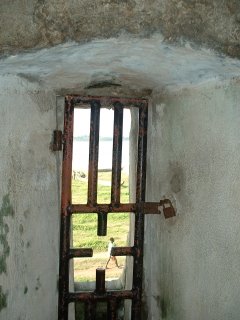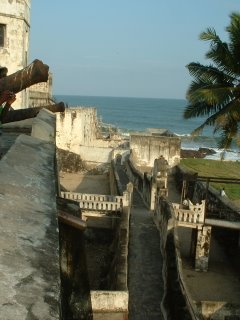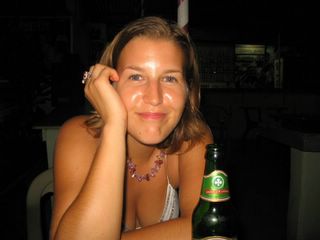Akwaaba in Ghana, Gate (Get) to Africa!
This blog is about my first year in sub-Saharan Africa and my internship with Oxfam Great Britain in Ghana.
Wednesday, August 23, 2006
Paths for Humanism
I started reading this book The Sociologically Examined Life. Pieces of the Conversation by Michael Schwalbe. I find it interesting and intellectually challenging. I even think of writing something on it as my reading goes on, and post it on this blog. I expect to learn a lot on making sense of life and the social world, and interpreting contingencies as determining elements of fates.
For now, there is this paragraph I want to publish because it refers to how I concluded one previous message (unfortunately, the languages are different between the two texts but I believe this one can be understood by all):
‘(…) [T]o acquire as much wealth and fame as possible (…) seems to be the main ambition for many people in our culture [I noted that Western culture does not seem limited to only Europe and America]; there are, however, other goals for a human life. You could try to enrich the lives of others by teaching, creating art, restoring a piece of the earth, promoting health, resisting violence, or organizing for change.
THE QUESTION IS WHAT KIND OF MARK DO YOU WANT TO LEAVE ON EARTH FOR HAVING LIVED?’
Don't answer 'I want to be remembered as someone who cared about and helped others'. As the author emphasises '(...) being concerned with how others think of us is different from being concerned with how we might affect the world through our actions'.
This task seems even more complex in a globalised world, yet which helps realise - by litterature, medias - that you are not alone. There are people out there sharing the same vision of idealism and desire of action. Have I already cited this book ‘Le Tour du Monde en 80 Hommes’? I should…
Slave Trade Remembered
The 23rd of August is the International Day of the Rememberance of the Slave Trade and its Abolition (promoted by UNESCO). I have already written on the issue and the significance played by Ghana and Bristol in the transatlantic slave trade. I also recently posted pictures taken at Elmina Castle where slaves were kept before they were taken away from Africa for what others had decided for them to be their last travel.
I learnt new information on the subject in the Daily Graphic today, such as the Wilberforce Institute for the Study of Slavery and Emancipation (WISE) at the University of Hull in England said to be Britain’s first institute for the study of historic and contemporary slavery and emancipation. The institute was named after homeboy William Wilberforce (he must have deserved the last component in his name) who was very instrumental in the legal ending of the British slave trade 200 years ago.
The write-up reminded me of a novel with the title ‘Le Hussard de la Liberté’. This fiction relates to real facts, namely slavery in the Caribbean and the uprising on the island of Santo Domingo (today Haiti and the Dominican Republic) during the night of August 22 to 23, 1791, which “shook the slave system radically and irreversibly and provided the impetus for the process which would eventually lead to the abolition of the Transatlantic Slave Trade”.
The character, Toussaint L’Ouverture (his name, which can be translated by ‘opening’ fits him also very well), was one of the leaders of the Haitian revolution and helped lead the slave uprising. This rebellion can be linked to the French Revolution of 1789 proclaiming the Rights of Man (Les Droits de l’Homme) to include all free men (at that time, it is rather certain that women were not included). However, when Napoleon Bonaparte came to power in France (11 November 1799), he began to work with colonists to return France's Caribbean territories to their earlier profitability as plantation colonies.
For more on Toussaint, Wikipedia, the free encyclopedia is a good starting point: http://en.wikipedia.org/wiki/Toussaint_L
The definition of slavery by the Director of WISE, “slavery now as in the past, denies people their identity”, brings me back to a research yesterday on child labour and this UNICEF publication: ‘The State of the World’s Children 2006: excluded and invisible’
(http://www.unicef.org/publications/index_30398.html). The report identifies four categories of forgotten children, one of them being ‘children without a formal identity’. ‘Without a registered identity, children are not guaranteed an education, good healthcare, and other basic services that impact their childhood and future’(http://www.eldis.org/). It can be said that they become easy preys to exploitation. Deprived of identity and status, they would not benefit of rights and access to protection.
Cinema in Ghana
From what I experienced, cinemas have become a rare thing in Ghana. I tried to find out why. The main reason seems to be that households possess the equipment to watch films at home such as the DVD player. Nigerian films are very popular in Ghana. It is difficult not to notice them, although I read recently in the newspaper about outbreak in the Ghana film industry.
Myself I have enjoyed watching DVDs at a friend’s. I was pleasantly surprised by ‘the beach’. I imagined it would be about three guys staying on a deserted island where things would start going bad between them. Not only… The plot made me think that, within the dream of living self-sufficiently in a community isolated from modernity, it is likely that problems arise between residents and that a good leader would easily turn into dictator.
I viewed another film, perhaps less known: ‘50 First Dates’ with Drew Barrymore and a funny guy who played in ‘Big Daddy’ (that I haven’t seen), Adam Sandler. I was far from disappointed, especially as I had convinced myself that it would be a flop. Well, this romantic comedy appeared to be captivating, combining humour and emotions around the folllowing (imaginary?) theme: after the girl was injured in a car accident, her short-term memory renews every 24 hours. This means that she forgets all that happened the very previous day. Hence the film title, ‘50 First Dates’, as the hero tries to seduce her everyday as if they were meeting for the first time. However, with determination, he will find a way to modify the situation. Imagine how it would be if it felt as the first kiss every time…
'Religious Entertainment'
One colleague argued that church has replaced the cinema way of entertainment. Another said that religion has invaded the medias – radio, TV. I agree. From what I have seen, dressed-up people go to church at least once a week, spend usually more than two hours, singing and dancing as if they were in a party. They are ready to give a big amount of money – I attended once and the pastor asked for ten percent of their income (dîme des chrétiens). I believe some think they will find their future partner for life there.
Tuesday, August 22, 2006
Latest (Good & Less Good) News
Je continue mon bonhomme de chemin au Ghana: déjà plus de sept mois de présence sur le territoire. Je commence à me sentir dans le bain. Ma couleur - certes toujours blanche - peut en décevoir certains à partir du moment où j'exhibe mon goût pour les négotiations marchandes (particulièrement en matière de taxis), je refuse de donner au premier venu sur ma route, etc... Je deviens en quelque sorte ghanéenne. Il ne me reste qu'à parler twee pour tromper significativement les apparences. Bien que je parviens à balbutier quelques mots, pratiquer la langue ne vient pas naturellement. Il faut dire que mon look n'incite pas les gens à s'adresser à moi dans une langue locale!
J'ai au fil du temps créé des relations - courtes, plus durables... - et j'explore les relations humaines comme il ne m'avait pas été donné l'occasion avant. Les comportements sont plus ouverts; la plupart des gens moins scrupuleux. Le proprio continue à gâcher la vie de ses locataires. A cause d'une dette auprès de la compagnie des eaux, il y a plus de deux semaines que le robinet a été coupé et que nous sortons receuillir l'eau dans les environs. C'est de l'exercice.
Ma vie sociale me montre la corruption de tous les jours. Je découvre l'attrait qu'exerce l'argent sur le monde - petit et grand - avec le matérialisme qui a envahi maint esprits et styles de vie. Accra semble héberger des riches comme on en voit moins à Bruxelles. Les signes extérieurs de luxe contrastent certainement plus dans un environnement majoritairement misérable et insalubre.
La qualité par contre est rare. Je suis sortie de chez une coiffeuse, avec un diplôme de coiffure de Londres et réputée comme seule capable de couper les cheveux des blancs, avec des côtés inégaux. Il faut parcourir des kilomètres pour trouver des chaussures à son goût, celles en vente provenant majoritairement d'Angleterre. Même après les avoir achetées, le tour n'est pas joué car elles peuvent vous lâcher au bout de cinq minutes à pied. Pas étonnant que j'ai entendu dire qu'avoir l'air bien est important; sinon on ne vaut rien!
J'ai cru à un moment que je pouvais me laisser aller à cette mode mais je réfléchis beaucoup (trop). C'est pourquoi certaines personnes semblent déceler une différence qui les attire vers moi. Hier, j'ai éprouvé la satisfaction de prester, après les heures de bureau... en tant que consultante. J'alimentais d'abord une conversation sur le travail des enfants en donnant des idées sur une stratégie de pladoyer et campagne. Ensuite, j'écoutais la requête de quelqu'un qui veut acheter une voiture en provenance de Belgique.
Cependant, je ne suis pas dupe et essaye de tenir compte de tous les paramètres. Par exemple, les gars qui peuvent se servir de ce prétexte pour s'approcher. Ceux-là, ils ne savent pas encore que, bien qu'ils ne se font plus d'illusions sur les Ghanéennes, un agneau peut cacher un loup. Sans effrayer, on peut être gentil en restant toujours sur ses gardes. Comme je ne dis pas tout, par souci de ne pas sâlir l'honneur ou simplement le noms de certains, je tire les leçons de mon expérience enrichissante. Au-delà et plus variée que l'argent - et même l'amour - qu'une majorité universelle poursuit comme buts ultimes de la vie.
Monday, August 07, 2006
Thursday, August 03, 2006
World Press Review
I spent the morning reading news on the state of the world, particularly the Middle-East again in the focus.
I feel concerned with what is happening in that region while Israel resumed air strikes today. Instability and insecurity have been going on for so long that any hope of a peace deal is tenuous. At most.
I first read a message from Oxfam on the crisis and what they are doing in Lebanon. I followed the link taking me to the specific page of the organisation's website http://www.oxfam.org.uk/what_we_do/emergencies/country/middleeast/index.htm
From there, I went to demand Tony Blair to call for an immediate ceasefire: not later but NOW! A recent news depicted the PM and Bush standing together against a truce. I visited the blog of a female Palestinian writing from Beirut where she's involved in Oxfam's actions. Areas under ongoing attacks are not forgotten as a 'Postcard from Gaza' shows.
BBC News website is referred to get in depth information on the crisis. I found the information is well treated as usual and from diverse angles.
I decided to visit IRIN, the UN Integrated Regional Information Networks http://www.irinnews.org/. In the minds of lots of people - for obvious reasons - the United Nations are connected to the United States. As predictible, this media seems to provide neutral reports of the facts.
What I appreciate with this source is that there are all sorts of information on theoritically all the countries. I subscribed to their update emails. The services are also in French.
On the same website, I found a story on Ghana written by a freelance journalist I met at a party. It's about the dumping of Accra's raw sewage in the sea and the related potential health hazards.
There are more reports on Ghana to find at this page http://www.irinnews.org/frontpage.asp?SelectRegion=West_Africa&SelectCountry=Ghana
I think this website is a useful and pleasant instrument to know more on various countries and topics.










